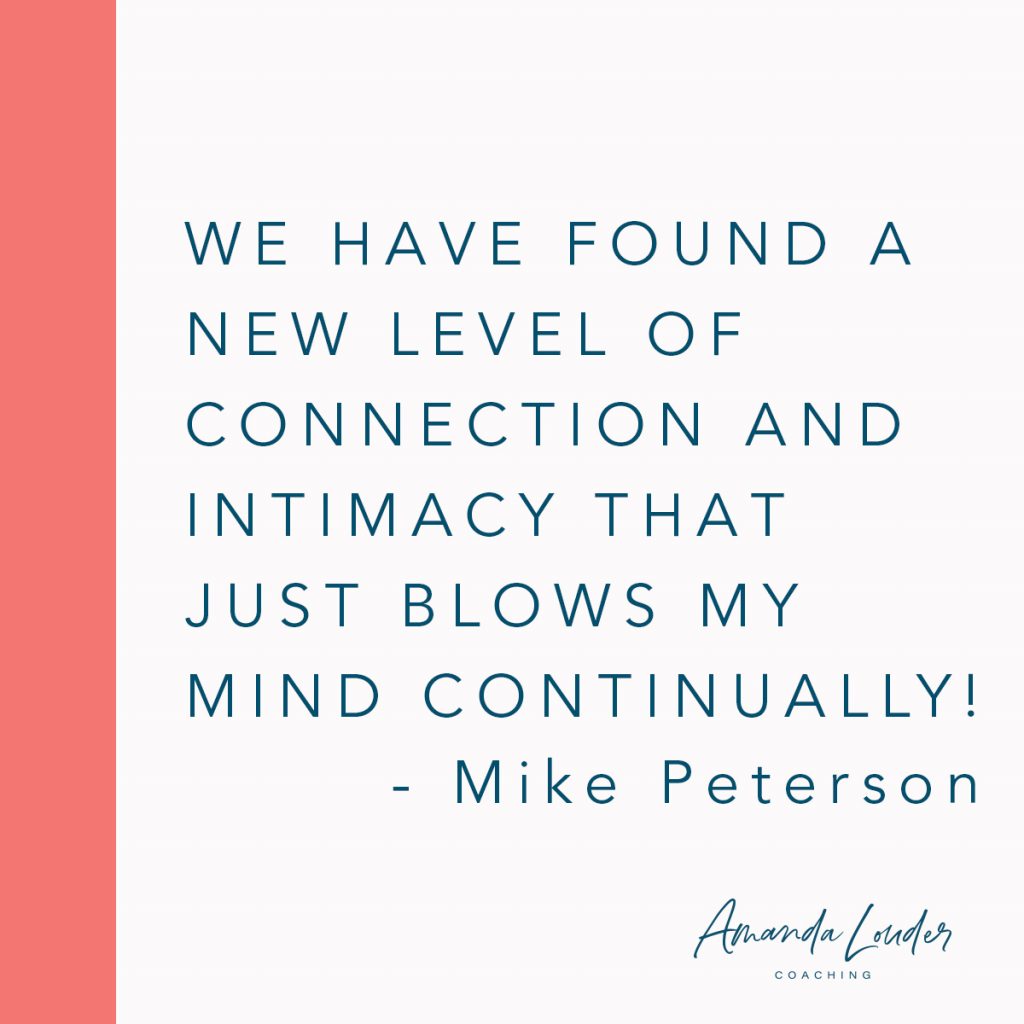
In this episode, I speak with Mike Peterson about his experiences with fixing his sexual relationship in his marriage. I am so excited to share with you the male perspective of what happens in a marriage when you become more like roommates than intimate partners. Mike lives in Sandy, Utah with his wife Tami and their 5 kids. His passion is talking with other men who are struggling in their relationships to help them avoid some of the mistakes he made while trying to improve his own marriage.




Show Notes:
Follow Amanda on Facebook and Instagram.
Join Amanda’s Private Facebook Group.
Show Summary:
Hello, everyone. Welcome to the podcast today. I am really excited to share this interview with Mike Peterson with you. But first I wanted to remind you about a couple of things. I have my Retreat coming up in October. I have a video course for women. I have an engaged couples course, and of course my group coaching program. And if you want to know about any of those things, the best place to go is to my website, Amanda lauder.com. And you can click on work with me up in the menu and learn about all of it.
I have as a guest on my podcast today, my friend Mike Peterson, and I have gotten to know Mike a little bit just online. We have met in person once, but I really appreciate the insights that he has into male sexuality. And I think you’ll be really intrigued by his story, but I’m going to let him tell that, but I love the transformation that he created in his marriage and with his own life. And so that’s why I’m sharing it with you today.
Amanda: So welcome to the podcast Mike.
Mike: Thanks, Amanda. Glad to be here.
Amanda: Why don’t you first just introduce yourself to my audience and so they can get to know you a little bit.
Mike: You said already that my name’s Mike Peterson. My wife, Tammy, and I have been married as of today, 20 years and 11 months exactly. Twenty-one years next month. We’ve got five kids. The oldest is 19. The youngest is nine. We live in Sandy, Utah. I run a little manufacturing company here nearby, and we’re mostly a soccer family. So we spend all our weekends at the soccer fields and we love that.
My hobbies mostly are talking about relationships with other guys. I just love it. It’s kind of become my passion.
Amanda: So let’s start with your story. Can you kind of just introduce us to your past and what things were like at the beginning of your marriage, what did you think things were going to be like? Where did it fall short?
Mike: I think probably the first 10 years of the marriage was pretty typical. We got along well, we didn’t argue much. Ten years in, we had four kids under the age of eight and life was busy. I was doing an MBA program. I was busy with church callings. My wife was staying at home with the kids and exhausted. Things were okay. And then sex started becoming a problem for us.
Amanda: In what way?
Mike: I wanted more and she didn’t.
Amanda: That sounds pretty typical. Tell us more about that.
Mike: With her busy, busy days, come nighttime, she was just exhausted and I wasn’t. I was ready to go and we kind of just got into this bad pattern of me trying to initiate sex and her telling me no. And I started to take it really personally. The rejection was really hard for me, so I often would end up pouting and withdrawing. Kind of even like punishingly withdrawing. Trying to guilt trip her for not meeting my needs.
Amanda: And were these things helpful?
Mike: No, they were not helpful. It started a really bad cycle.
Amanda: So what would happen?
Mike: Well, I would pressure her. I would kind of try to guilt her into sex and sometimes she would give in and sometimes she wouldn’t and when she did given it, wasn’t very fulfilling and connecting sex, it was just kind of perfunctory, kind of obligatory. And it wasn’t very fulfilling to me, but I kind of didn’t care either at the time.
To me, back then, and for a long time, I thought sex was intimacy. I thought if we were having a good sexual relationship, then we must have an intimate relationship. It took me a long time to figure out that that wasn’t the case. To separate and distinguish between those two.
Amanda: So what made you finally start to distinguish between the two? How long did that go on?
Mike: That went on for a couple of years and it just seemed to kind of get worse. Right before our fifth child was born, so this was 12 years into the marriage, I got so tired of being rejected and hurt by it, that I just vowed to myself one night that I would never ask for sex again.
It was a very resentful, punishing decision. I didn’t tell her about, it just in my own head, but I thought, Never again.
Amanda: What did you think was going to happen by doing that?
Mike: Honestly, I don’t know what I thought would happen. Embarrassingly, I thought maybe she would feel punished. I think in a way I wanted her to see how it feels if I stop asking you for sex and stopped chasing you and stop desiring you. You see how it feels.
That did not work. We did this for five years. We maybe had sex three or four times a year, kind of just like on special occasions.
Amanda: Was it like she wanted it then? Was she initiating or was it just like obligatory again? Like, Okay, it’s our anniversary, I guess we have to.
Mike: Yeah, exactly. Just kind of an assumption probably on both our parts.
Amanda: And when it was happening, was it fulfilling?
Mike: Not necessarily, no. In reality, it was not a punishment to her. She’s told me many times that she was blissfully happy for those five years.
Amanda: Yes! I’ve heard that from many a woman.
Mike: Not necessarily just because of the lack of sex, but her life was kind of complete at that point. She had her five little kids. She had a perfect little family. She was the stay at home mom. She had her hobbies and she thought she had arrived. That was her vision of what her life was going to be. And then she had a husband there too and we got along. We were great business partners, we were good roommates, but there just wasn’t much connection, much intimacy of any kind really.
Amanda: And I think that’s a lot of times what women think that they’ve arrived when they’ve gotten everything like that, but they don’t realize what they’re actually missing and how much fuller their life could be just by improving this part of their life. So many times, I think women put so many things ahead of their marriage and ahead of their sexual relationship. Yes, we’ve got a lot on our plates. We’ve got a lot going on and lots of kids and all that kind of stuff, but the marriage relationship is the one that’s supposed to be your top priority. The one that we’re wanting to last through eternity, but if you’re missing that essential part, you’re kind of missing the point.
Mike: We would argue about that. I would tell her that she needed to choose me before the kids and before anything else. And of course that didn’t work. That wasn’t very “choosable” of me.
Amanda: How do you think she felt when you said things like that? Knowing what you know now.
Mike: Based on what she’s told me, she often just felt insufficient. She felt like a disappointment to me. She felt not enough for me. My constant complaining, the disappointment I conveyed to her. She just wasn’t enough for me and worried that she maybe never would be because even when she would try, even when she would make an effort, I’d still find some way to say, Oh yeah, it was great, but you know, what would be even better? My bucket had a hole in the bottom of it. And even when she tried to fill it, she couldn’t fill it.
Amanda: And I hear that a lot from women that they feel like if they start to develop this part of themselves, their husband will become insatiable. It’ll never be enough. That’s something I hear a lot. Is it ever enough?
Mike: No, because she could never fill my bucket until I plugged the hole in my bucket. And that was my job to do, but I didn’t realize that. We spent a good three years or more with me trying to get her to validate me, trying to get her to fill my bucket. Trying to fix her so that I could be happy.
To me, our sexual relationship was the problem and she was the problem in our sexual relationship. And so I listened to podcast after podcast and did courses and read books, all with the idea of how I could fix her. How I could help her learn to like sex, because if we could just figure it out that one piece, everything would be good.
Amanda: I’m guessing those all worked magically, right?
Mike: Spoiler alert. No, they did not work. Things just kept getting worse. We just kept getting further and further apart. I wanted us to do couples therapy, but she wouldn’t do it because she knew the only reason I wanted to do couples therapy was to fix her. And, she refused. So I started doing individual therapy and that was kind of where it started, where a trained therapist was able to help me see how I was contributing to this dynamic and where I was going wrong. Eventually because I made it a little safer for her to consider therapy, we eventually did do couples therapy and that was a big help for us.
Amanda: So what changed? What turned things around?
Mike: Well, in a nutshell, it was when I stopped trying to fix her and just tried to fix myself. But first I had to see where I was contributing to the dynamics that were causing us so much grief. And that took me a long time. I read a book that was recommended to me called No More Mr. Nice Guy. That really resonated with me to see how the nice guy that I thought I was, the nice guy that I thought was so attractive and that women everywhere would just jump at the chance to have a guy like me, was actually not very attractive, not desirable. That was a real eye-opener for me.
Amanda: How did you feel when you started to learn these things about yourself?
Mike: It was painful, I guess. I had an image in my head of who I was and that kind of crumbled down as the curtain got pulled back. It was uncomfortable, but at the same time it was empowering because I started to feel like maybe I have more control over improving our relationship than I did previously because I used to think she was the problem. And if she was the problem, well, then she was also the solution and I tried and tried to fix her and I couldn’t, and it was disheartening. I started to feel hopeless.
Once I started looking in the mirror at the problem and taking ownership, that’s when I started to feel hopeful that I can do something about this now.
Amanda: So tell me what you did to actually change things. What did that look like?
Mike: I remember the day things kind of turned a corner for me. I was cleaning the garage, listening to a podcast, of course, trying to figure out another way to fix my wife. And I heard this analogy about trying to catch a bird. And if you’ve ever tried to catch a bird, it’s impossible. You chase this bird and the second you get even close to it, it just flies away. And then you’re swinging at it and you’re going crazy trying to catch his bird and it’s basically impossible. And they said on the podcast, the only way to really catch a bird is to build a birdhouse that the bird wants to come to. That is inviting. That is attractive. That is safe. And that is how you catch a bird.
Some light bulb just went off in my head! I thought, Oh, I have to stop chasing the bird. I need to build a better birdhouse. So that’s kind of how it clicked for me that I needed to just start working on myself. That if I wanted to feel desired by my wife, then I needed to become more desirable. If I wanted her to want me, then I needed to become worthy of being wanted. A big part of what I figured out was how I had been using sex for validation. Sex, wasn’t just sex. Sex wasn’t just connection and intimacy and fun. It was a way for me to feel validated. I wanted my wife to initiate sex. I wanted her to be chasing me and pursuing me because I wanted the validation that that would give me. And so for me, a lot of what I had to learn to do was to separate sex from validation and stop chasing her for validation and find other ways to self validate. I didn’t have any hobbies. I didn’t really have any friends. I had basically put all my eggs in my wife’s basket to be my everything. I needed her to be my everything. And I was very needy, very clingy. That was really smothering to her. She couldn’t even breathe and she couldn’t do it.
Like I said, my bucket had a hole in the bottom of it. And so I had to figure out on my own how to plug that bucket. It took a lot of therapy. I kept listening to the same podcasts and doing the same courses and books, but my focus changed. It became more about how to improve myself, how to become the man I wanted to be, and figuring out what that looked like.
Amanda: What did that look like for you?
Mike: For me, it was about, I had been trying to take from my wife. I had been asking her to make me feel like a man, to make me feel enough. And I didn’t want to do that anymore. I wanted to be her rock. I wanted to be her strength. I wanted to be somebody that she could lean on instead of me leaning on her.
It’s been so helpful for me to form relationships with other men too. To get vulnerable with other men, to open up. Just talk about our struggles and the more I do that, the more I realize we are all in the same boat. Nobody’s talking about it. And as we open up and get real with each other, we find support and strength and instead of taking our complaints and our weaknesses to our wives, we call up our brothers and we say, Hey guys, I need a lifeline here. I’m freaking out and I need some help. Then we walk each other through it and then we go to our wives in strength, in courage and integrity, instead of taking all of the flaws and weaknesses and shortcomings to our wives and asking them to sooth us and to validate us.
Amanda: So by doing this, how did things change?
Mike: Well, the way my wife puts it is, I took the pressure off of her and gave her space to breathe again and to start working on herself. Not out of fear, not out of trying to please me, not out of obligation, but just because she wanted to have a better relationship too.
Amanda: I’ve heard you talk about doing a sex fast.
Mike: Yes. We did that. Thanks for mentioning that. I asked her, or I told her, I guess, better that we needed to stop having sex for some period of time to benefit both of us really. I needed to learn to kind of disentangle the validation I was after through sex and for her, I didn’t want to have sex with me just because I wanted her to. I didn’t want to have sex with her again until it was for her benefit because she wanted it, which honestly, at first she was like, Well, you’re going to be sorry, because I could go the rest of my life or have sex again. But I said, you know what? That’s okay. Because the bad kiind of obligatory duty sex we’re having, it’s not that great. It’s not fulfilling. It’s probably doing more harm than good. So I hope that’s not the case, but if so, then I guess it is what it is.
Amanda: Is she, I know you have to speak for her, but do you think that she felt like any time that you were loving and affectionate, that it would automatically lead to sex?
Mike: A hundred percent. She became so leery of just my touch. It would kind of make her bristle because there was a meaning in my touch. She knew what I wanted. And she got to where she wouldn’t touch me. She would consciously make an effort not to get too close to me, not to cuddle up to me because she did not want to lead me on and set up an expectation that she wasn’t ready to meet.
So the break from sex was really helpful for both of us, because with the sex off the table and out of the way, we were both able to relax. I could just hang out with her, cuddle, talk, snuggle, whatever, without the thought in the back of my mind that, Oh, I hope this leads to sex.
Amanda: And she thought that too! She’s like, Oh, it’s not going to so I can actually engage. Right?
Mike: Yup. I can touch him. I can tickle him. I can caress him, whatever.
Amanda: And be touched.
Mike: Yeah, and allow me to touch her. So it was very helpful.
Amanda: And, and how long did this last for you?
Mike: It was. Just short of three months and I survived. I did not die! Honestly, by the end of it, she was ready to go. She was chomping at the bit. Like when are we going to be done with this break?
Amanda: Do you feel that it was a lot like the days when you were dating and engaged where it was building that physical relationship without it leading to sex.
Mike: Yeah. Sadly, we had forgotten how to have any form of intimacy besides sexual intimacy, like physical intimacy, emotional intimacy, spiritual intimacy, like it had all really fallen by the wayside because sex just always got in the way. So it was a great three months where we kind of relearned how to connect in other ways, kind of created a more stable, solid foundation that when the break was over, we were able to start building something better on top of that foundation of intimacy.
Amanda: I love that. Mike, I love that so much. I wish more men would have the courage to do something like that because I think it would be so beneficial to their relationships, but the thought of going three months or, you could do 30 days, you could do 60, you could do whatever timeframe you set, right? I mean, you can do whatever it is, but the thought of that scares them. And so they just refuse and accept duty sex, obligatory sex, instead of allowing themselves to really develop this intimate relationship.
Mike: Yeah. I felt the need to do it for a long time before I did it.
Amanda: It does take courage. It does.
Mike: And it just came down to the fact that I just didn’t want the bad sex anymore. I wanted something better and if I really wanted something better, well, then what was I willing to do for it? I couldn’t just talk the talk I had to walk the walk and do something.
Amanda: I love that. That if you wanted something better, what were you willing to give up for it? Because, that’s true with so many things in our lives, right? Whenever we want something more, we always have to be willing to give up things for it. So I think that’s a great question that the audience can ask themselves is what do you want and what are you willing to give up for it?
Okay. So you did the sex fast. Things really started to turn around. Where did I go from here?
Mike: So, the day before we ended the sex fast was probably the most important day in our relationship. I kind of had a little come to Jesus moment where I saw how selfish I had been, how pressuring, how entitled I had been trying to force my wife to increase her desire for me, for my own selfish reasons.
And I had been just oblivious to her needs, to her wants. I never really stopped to think, Well, what does she want our sexual relationship to look like? I just knew what I wanted it to look like. And that’s all that mattered. And I was right. And that was the end of the story. That gap between where my desire was and her desire was really the source of our problem. We were trying to bridge that gap and I had been trying to bridge it by getting her over onto my side of the bridge. But through the course of our sex fast and my awakening moment, I thought, I can go to her side of the bridge too. And so that’s what I did.
I said, I am so sorry for trying to force you to come to me. I’m ready to come to you and whatever you want our sexual relationship to look like right now. That’s fine. If you don’t want to have sex ever again, well, maybe that’s even fine because I love you more than I love having bad sex with you.
Amanda: And when you’re saying bad sex, what does that mean?
Mike: I mean, it’s one sided. It’s void of real passion, real connection. There’s just something in it that I can tell she was doing it for my benefit. She was checking a box.
Amanda: If this is too personal, then you don’t need to share. Was she not getting pleasure out of it? Was she not having orgasms or was that happening? But it just, it still wasn’t the connecting that you wanted.
Mike: She comes first every time. And so of course I’m thinking, How could you not like sex? What is there not to like about sex? Why don’t you want to do this every day like I do? But it wasn’t the physical part of it. It was the emotional, it was the meaning that I was bringing to sex. It was the taking, the sucking the life out of her, trying to get validation through sex. That’s why she wasn’t into it. That’s why she didn’t want it as much as I did.
Amanda: Okay. So you did the sex fast, you had this big time the day before it ended. And then what?
Mike: I basically was able to just apologize, I told her I was done pressuring her to try and change her and that I was grateful for her. I was so lucky to have her. I loved her just as she was, lower desire and all, and I accepted it. I just found that ability to just love and accept her exactly as she was. And I’ll never forget what she said. She just looked at me and she said, Oh babe, this is huge.
It changed everything for us. It just changed the whole trajectory of our relationship. We got on the same page. I came to her page. And then together, we started building something better. Together. Like collaborating together, like on the same team instead of opponents trying to force the other one over to our side. I just joined her and it’s not perfect. It hasn’t been perfect. There’s still been ups and downs, but we’ve been doing it together. And it’s just been beautiful.
Amanda: You said that you were able to just love her and accept her for her. Do you think that the reason that you’re able to do that is because you did it for yourself first?
Mike: Yes. At this point, I had learned a little bit more about self-validation, about self-acceptance. I’d kind of taken that pressure off of her and found it from within, I found it from the men that I was building relationships with. And honestly, I found it from God. Part of my come to Jesus experience was reconnecting with God for the first time in a long time, in a different way. That was very fulfilling to me.
Amanda: Yeah. I mean, you know, the commandment is love thy neighbor as thyself, which I think that means you have to love yourself in order to love others. You can only love others as much as you love yourself. So, you know, that’s why a lot of the work that we do in my coaching program is helping women to be more secure in themselves, because then they are more fully able to love their spouse, which is really the best.
Okay. So what do things look like now?
Mike: It’s no exaggeration that we are happier than we have ever been. Like even dating, engaged, newlyweds. That was all good. But we have found a new level of connection and intimacy that just blows my mind continually. I say to myself, Is this real life, is this really happening? Or are we really this happy? I told her just a couple of weeks ago, we were talking in bed and I said, you’re my best friend. And I thought that was a given in marriage. That you married your best friend. But I had realized over the years that she really wasn’t, that we weren’t best friends. And now I really feel like we are. I love talking to her. I love being with her, spending time with her. And it’s the intimacy, not just the sexual, but it’s real intimacy.
Amanda: They always talk about how women need that emotional intimacy before they can engage in physical intimacy. How do you think that happens in your marriage? How’s she getting that emotional intimacy?
Mike: It’s just part of the relationship now. We talk. Our favorite thing is just to get in bed at night and we’ll just sit and talk for a little bit or maybe we’ll watch a show together, but we’re there, we’re connecting, we’re cuddling and it’s just kind of interwoven into our days.
Amanda: So it’s not like I need to emotionally connect with her, so then she’ll have sex with me anymore. It’s just part of the relationship at this point.
Mike: Yeah. And, and honestly it’s as fulfilling for me as it is for her. My high drive for sexual intimacy has gone way down because I’m so fulfilled and connected in other ways that I’m not always chasing the sex, craving that. It’s still a great part of the relationship, but it’s not as essential, not as critical to me to feel loved, to feel close to her, because I find that fulfillment in so many other ways.
My bucket is fixed and it’s overflowing Amanda!
Amanda: I love that. So what advice would you give to other men who are in this same situation that you were?
Mike; Well, the bird house analogy that was so instrumental for me, I think is just a great visual reminder of where the work needs to be done. Chasing the bird nonstop is not the solution, the birdhouse has to be fixed. Sometimes from the ground up. And really, if you’ve got the means to connect with other men in some meaningful way, if you can open up to a buddy, to a brother, whoever you can find. To find good men to support us in this journey has been really instrumental.
Amanda: I think that’s awesome. So thank you so, so much for coming on the podcast and we decided not to include your wife in this one because we really wanted to hear your perspective, but thank her as well for letting you come on and letting you share some of her experience too. I just, I think, most of this podcast is focused on women. But I think it’s really important to see the men’s perspective.. I mean, I have a lot of men that listen.
Mike: Yep! I’m a long time listener!
Amanda; A lot listen to understand sex and their wives better. And I think it’s really, really helpful for both parties to hear a man’s perspective and what they can do to hopefully make a great sexual relationship and a great overall relationship with their spouse. So thank you so much for coming on Mike.
Mike: It’s been a pleasure. Thanks for having me.
Wasn’t that interview so good? I work exclusively with women and when they are ready, like Mike’s wife did, to really invest in themselves and grow themselves. That’s where I come into play. Your wife might not be ready for that yet, but it’s going to make it a lot more possible when you do the work on yourself if you’re the husband. I am a big believer that it only takes one to change a marriage. One person can be the catalyst for that change. Sometimes it needs to be the husband and sometimes it needs to be the wife. But when you start showing up differently in your marriage and your sexual relationship, your partner is forced to show up differently as well. And that’s where change really happens.
But I really want to encourage the men here to work on themselves in the way that Mike has. If you are looking for resources on how to do that, feel free to reach out to me on DM or email amanda@amandalouder.com. I can give you some resources where you can start to work on yourself, but it really is so helpful in the process that the wives go through for the husbands to be working on themselves at the same time.
So many times women come to me, just like Tammy came to Mike feeling very broken and feeling a lot of pressure, which I of course work on with them. But it really helps in their progress to have the husbands working on themselves. The couples who do this alongside each other tend to make a lot more progress.
I do incorporate the husband’s a lot into my program and what I do. So the way that my program works is you have a weekly video, which the husband can watch right alongside the wife, if she wants him to. And then we have our weekly group coaching calls, which we do not allow husbands on the live call just to maintain the safety of the group, but all of our calls are recorded and the wives can share those recordings with their husband if they choose to.
I give every woman a digital workbook so you can make extra copies for your husband to work through the pages. And, I give every one of my clients a private call with me sometime during our 12 weeks together so that we can either dive deeper or talk about something different or they can bring their husband onto that call and they can work on things as a couple.
So I am here to support you in whatever way I can as you go through this journey and hopefully the husband will go on it too, so that you can both grow and it is uncomfortable, and it is hard, but it is so worth it. And I hope that you saw that through this interview with Mike.
Thanks so much for joining me today. Feel free to reach out to me if you have any questions and we’ll see you next time. Bye-bye.



